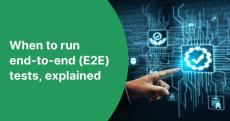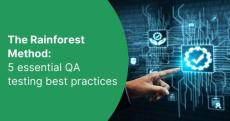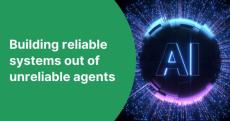|
By Mike Sonders
When you want to expand your QA testing capabilities or resources, Testlio can recruit QA specialists from their large “crowd” of QA personnel. Testlio also provides a platform to manage your tests, test runs, and results. If you’re considering a platform-enabled QA service like Testlio, there are a handful of other noteworthy providers you should know. We’ll cover them in this piece.
|
By Mike Sonders
Our new research shows AI adoption is high across software testing workflows. But AI isn’t (yet) paying off in ways that matter to software teams using open-source testing frameworks like Selenium, Cypress, and Playwright. Open-source teams using AI are still spending just as much — if not more — time on painful test writing and maintenance tasks than ones not using AI. Contents Toggle.
|
By Mike Sonders
We sometimes have customers tell us they want to run end-to-end tests as often as possible in their development processes — as often as every commit. When you really care about quality, this might seem like a reasonable idea. After all, doesn’t the principle of shift left tell us to test as early as possible in the software development lifecycle? To catch bugs and other issues when they’re the least-expensive to fix?
|
By Mike Sonders
When you’re ready to automate your manual tests, you might naturally think you need to hire someone with a technical skill set who specializes in automating end-to-end tests. That is, you might think you need to hire a QA engineer. It’s not an unreasonable assumption. But for many startups, it’s the wrong thing to do. QA engineers are quite expensive (in more ways than one), bottleneck release processes with their complex tooling, and can present other types of business risks.
|
By Maciej Gryka
If you’re one of the cool kids building AI-based products you’ve probably heard of — or are already doing — RAG. If you’re not, let me tell you what RAG is before telling you one weird fact about it. “Retrieval-Augmented Generation” is nothing more than a fancy way of saying “including helpful information in your LLM prompt.” Still, there are many ways to do it and many questions to answer when building a RAG pipeline.
|
By Mike Sonders
We’ve integrated generative AI features deeply into our no-code test automation platform, Rainforest QA. Each of these features is designed to help you avoid the time-consuming and otherwise annoying work of keeping automated test suites up to date — so your software development team can stay focused on shipping, fast. In this video, our CEO, Fred Stevens-Smith, walks through what some of these genAI features look like in action.
|
By Mike Sonders
When you’re ready to make the transition from manual testing to test automation, it’s natural to consider hiring. A QA engineer — who has the technical skills to write and maintain automated tests in an open-source framework — can take the burden of end-to-end test management off of your development team, allowing them to ship more code, faster. But hiring a good QA engineer is — often prohibitively — expensive.
|
By Mike Sonders
Is your startup operating with no QA team and trying to figure out your options for improving software quality? Perhaps you’re proactively thinking about your QA process before quality becomes a problem. Our maybe quality issues have forced you to finally address your QA process (or lack thereof). Either way, end-to-end (e2e) automated software testing is always part of the answer.
|
By Mike Sonders
Over a decade of helping startups improve quality, we’ve arrived at a set of QA testing best practices that work for teams shipping fast and frequently. They fit neatly into five organizing principles: Together, these principles represent The Rainforest Method. We’ve built our QA solution to make it easy for you to put this software testing method into practice and develop a quality product. A few notes: Contents Toggle.
|
By Maciej Gryka
If you’ve tried building real-world features with AI, chances are that you’ve experienced reliability issues. It’s common knowledge that AI makes for great demos, but… questionable products. After getting uncannily correct answers at first, you get burned on reliability with some wild output and decide you can’t make anything useful out of that. Well, I’m here to tell you that there’s hope.
|
By Rainforest
See how long it takes for the exact same test steps — covering a login flow for Wikipedia — to be created in Rainforest vs. Playwright. Using Rainforest's no-code platform is up to 3x faster than using an open source framework like Playwright to automate end-to-end tests.
|
By Rainforest
Available now at www.rainforestqa.com
|
By Rainforest
Now available at www.rainforestqa.com
|
By Rainforest
Get five hours of automated testing for free every month when you try it at https://www.rainforestqa.com.
|
By Rainforest
See how Rainforest QA works in less than two minutes.
- December 2024 (1)
- November 2024 (1)
- October 2024 (2)
- July 2024 (2)
- June 2024 (2)
- May 2024 (2)
- April 2024 (4)
- March 2024 (2)
- September 2023 (2)
- August 2023 (2)
- February 2023 (1)
- January 2023 (5)
- December 2022 (1)
- November 2022 (1)
- August 2022 (3)
- July 2022 (3)
- June 2022 (2)
- May 2022 (2)
- April 2022 (3)
- March 2022 (7)
- February 2022 (2)
- January 2022 (2)
- December 2021 (4)
- November 2021 (5)
- October 2021 (4)
- September 2021 (8)
- August 2021 (5)
- July 2021 (4)
- June 2021 (2)
- March 2021 (1)
- February 2021 (1)
- January 2021 (2)
- December 2020 (1)
- November 2020 (6)
- October 2020 (4)
- August 2020 (2)
- June 2020 (15)
- April 2020 (1)
- March 2020 (2)
- October 2019 (1)
- May 2019 (2)
- April 2019 (4)
- March 2019 (2)
- February 2019 (2)
- February 2016 (1)
Rainforest QA is changing the way QA is done in an era of continuous delivery. Our on-demand QA solution improves the customer experience by enabling development teams to discover significantly more problems before code hits production. Hundreds of companies including Adobe, Oracle and Solarwinds use Rainforest to automate their QA testing process and easily integrate it with their development workflow via a simple API.
No Code Automated Testing:
- Powering Collaboration: Empower everyone on your team with no-code automation testing. Rainforest Automation rapidly scales coverage and drastically decreases software testing time.
- Best of both worlds: A new way to write and execute tests combining the best of human and machine based testing. Have both the flexibility of large test coverage and the ability to fall back to human testers when needed.
- Custom Workflows: Unite automation and manual testing within a single suite and customize your workflow: run against humans for major production releases, run every branch merge against robots.
One platform for both manual and automated software testing.





















